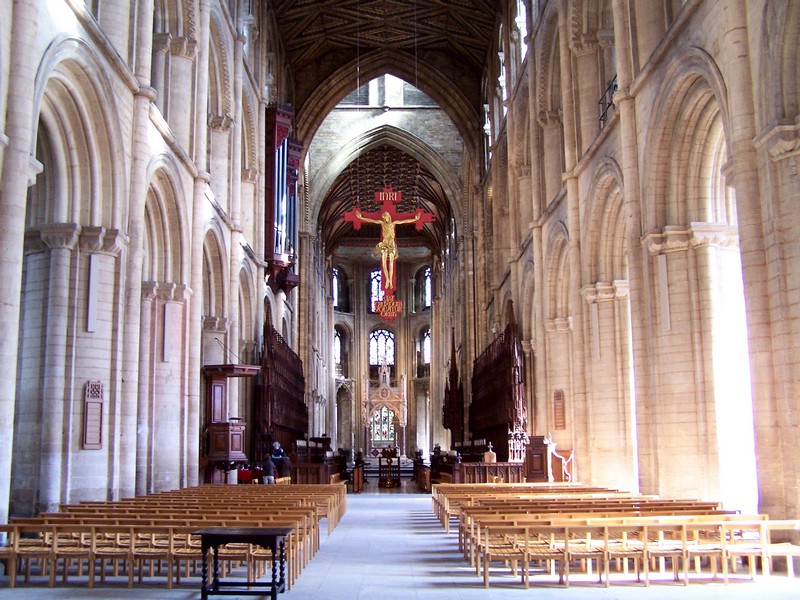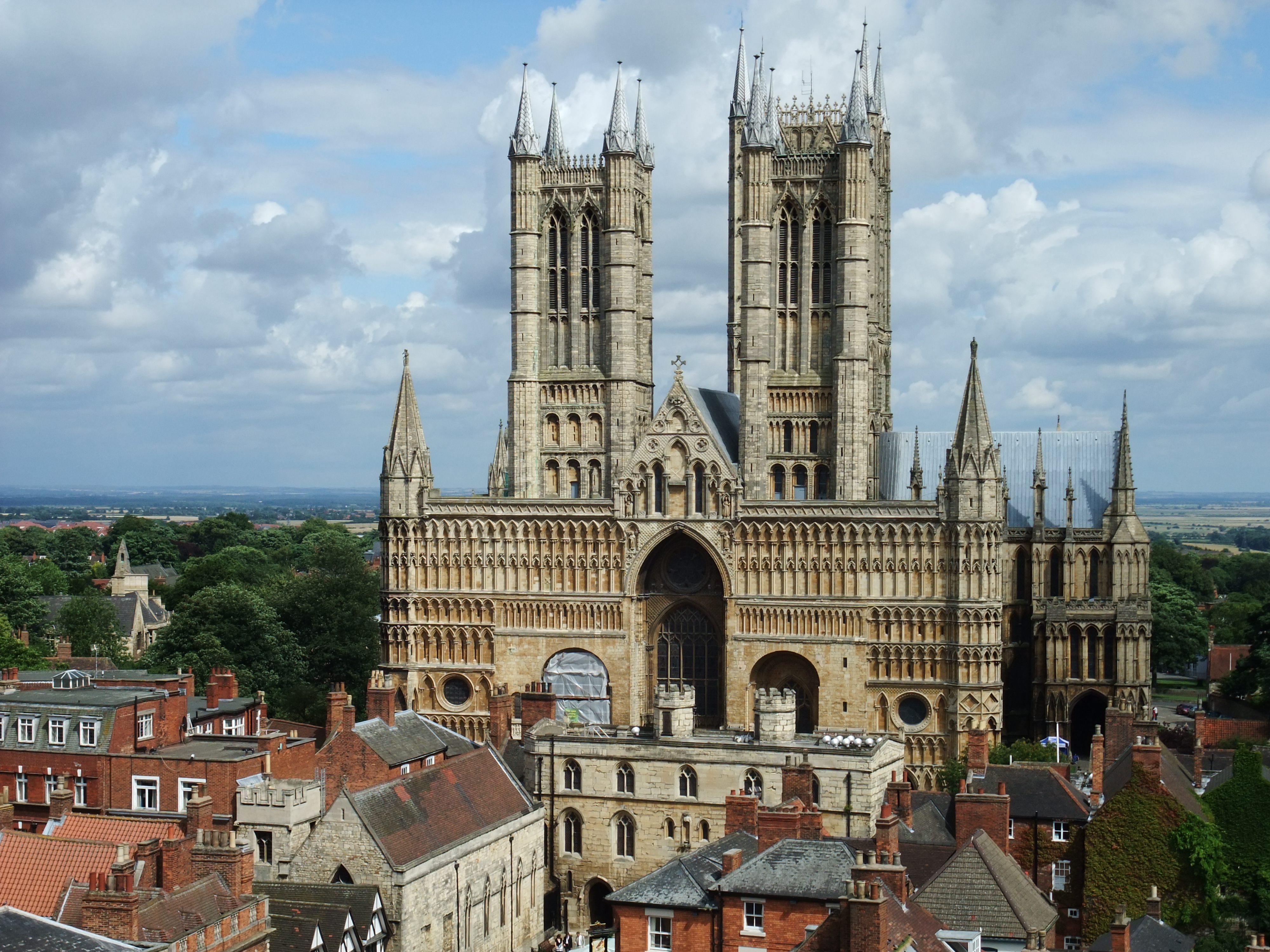|
Edward Gee (priest, Born 1657)
Edward Gee (1657–1730) was an English churchman, known as a controversialist, and later successively Dean of Peterborough and Dean of Lincoln. Life The son of George Gee of Manchester, a shoemaker, he was baptised at Manchester Collegiate Church on 29 August 1657. After attending Manchester Grammar School, he was admitted a sub-sizar at St John's College, Cambridge, on 9 May 1676. He graduated B.A. in 1679 and M.A. in 1683. He was incorporated in his master's degree at Oxford 4 March 1684. Subsequently, he is styled D.D., a Lambeth degree from 1695. He took a prominent part in the anti-Catholic controversy towards the end of James II's reign. In May 1688 he was appointed rector of St Benet's, Paul's Wharf, London, and soon after he was called chaplain in ordinary to William III and Mary II. On 6 December 1701 he was installed prebendary of Westminster. Twenty years afterwards, on 9 December 1721, he was instituted dean of Peterborough, but he resigned that office for the dean ... [...More Info...] [...Related Items...] OR: [Wikipedia] [Google] [Baidu] |
Dean Of Peterborough
The Dean of Peterborough is the head of the chapter at Peterborough Cathedral. On the Dissolution of Peterborough Abbey in 1539 and the abbey-church's refoundation as a cathedral for the new bishop and diocese of Peterborough, care for the abbey/cathedral church passed from an abbot to a dean. The current Dean of Peterborough is Chris Dalliston List of deans Early modern *1541–1542 Francis Leycester :(last prior of St Andrew's Priory, Northampton) *1543–1549 Gerard Carleton *1549–1557 James Curthoppe *1557–1559 John Boxall (deprived) *1560–1583 William Latymer *1583–1589 Richard Fletcher *1590–1597 Thomas Nevile *1597–1607 John Palmer *1607–1612 Richard Clayton *1612–1617 George Meriton *1617–1622 Henry Beaumont (later dean of Windsor) *1622–1630 William Piers *1630–1639 John Towers *1639–1640 Thomas Jackson *1640–1660 John Cosin *1661–1664 Edward Rainbowe *1664–1679 James Duport *1679–1689 Simon Patrick *1689–1691 Richard Kidder ... [...More Info...] [...Related Items...] OR: [Wikipedia] [Google] [Baidu] |
Louis De Sabran
Louis de Sabran or Lewis Sabran (1 March 1652 – 22 January 1732) was a French Jesuit. He was associated with the court of James II of England and engaged in vigorous theological debates with both Anglican and Puritan spokesmen. Early life and education He was born in Paris in 1652 to the Marquis de Sabran of Provence, a French ambassador in London during the Commonwealth who visited the Catholic martyrs Ralph Corbie and John Duckett before their executions. Louis married an English lady, was educated at the English Jesuit College of St. Omer, being ordained in 1679 and admitted to the Society of Jesus in 1688. Career In 1687 he was made the royal chaplain to James II. A sermon he preached to the king on August 28 of that year on the invocation of saints led to a pamphlet war with William Gee, a Puritan. He also entered into a controversy with William Sherlock, the Anglican theologian and Dean of St. Paul's. He was the assumed author of ''Dr. Sherlock Sifted from his Bran a ... [...More Info...] [...Related Items...] OR: [Wikipedia] [Google] [Baidu] |
Deans Of Lincoln
The Dean of Lincoln is the head of the Chapter (religion), Chapter of Lincoln Cathedral in the city of Lincoln, Lincolnshire, Lincoln, England in the Church of England Diocese of Lincoln. Christine Wilson (priest), Christine Wilson was installed as Dean on 22 October 2016.Diocese of Lincoln — New Dean of Lincoln (Accessed 27 May 2016) List of deans High Medieval * Ranulph (Dean of Lincoln), Ranulph ''or'' Ralph (Dean of Lincoln), Ralph *aft. 1093–bef. 1133 Simon Bloet *–1141 Philip of Harcourt *1141–1179 Adelelm (Dean of Lincoln), Adelelm *–1182 Geoffrey (Dean of Lincoln), Geoffrey *1183–1189 Richard FitzNeal *1190–1195 Hamo (Dean of Lincoln), Hamo *–bef. 1223 Roger d ...[...More Info...] [...Related Items...] OR: [Wikipedia] [Google] [Baidu] |
18th-century English Anglican Priests
The 18th century lasted from January 1, 1701 ( MDCCI) to December 31, 1800 ( MDCCC). During the 18th century, elements of Enlightenment thinking culminated in the American, French, and Haitian Revolutions. During the century, slave trading and human trafficking expanded across the shores of the Atlantic, while declining in Russia, China, and Korea. Revolutions began to challenge the legitimacy of monarchical and aristocratic power structures, including the structures and beliefs that supported slavery. The Industrial Revolution began during mid-century, leading to radical changes in human society and the environment. Western historians have occasionally defined the 18th century otherwise for the purposes of their work. For example, the "short" 18th century may be defined as 1715–1789, denoting the period of time between the death of Louis XIV of France and the start of the French Revolution, with an emphasis on directly interconnected events. To historians who expand t ... [...More Info...] [...Related Items...] OR: [Wikipedia] [Google] [Baidu] |
17th-century English Anglican Priests
The 17th century lasted from January 1, 1601 ( MDCI), to December 31, 1700 ( MDCC). It falls into the early modern period of Europe and in that continent (whose impact on the world was increasing) was characterized by the Baroque cultural movement, the latter part of the Spanish Golden Age, the Dutch Golden Age, the French '' Grand Siècle'' dominated by Louis XIV, the Scientific Revolution, the world's first public company and megacorporation known as the Dutch East India Company, and according to some historians, the General Crisis. From the mid-17th century, European politics were increasingly dominated by the Kingdom of France of Louis XIV, where royal power was solidified domestically in the civil war of the Fronde. The semi-feudal territorial French nobility was weakened and subjugated to the power of an absolute monarchy through the reinvention of the Palace of Versailles from a hunting lodge to a gilded prison, in which a greatly expanded royal court could be more easi ... [...More Info...] [...Related Items...] OR: [Wikipedia] [Google] [Baidu] |
1730 Deaths
Year 173 ( CLXXIII) was a common year starting on Thursday (link will display the full calendar) of the Julian calendar. At the time, it was known as the Year of the Consulship of Severus and Pompeianus (or, less frequently, year 926 '' Ab urbe condita''). The denomination 173 for this year has been used since the early medieval period, when the Anno Domini calendar era became the prevalent method in Europe for naming years. Events By place Roman Empire * Gnaeus Claudius Severus and Tiberius Claudius Pompeianus become Roman Consuls. * Given control of the Eastern Empire, Avidius Cassius, the governor of Syria, crushes an insurrection of shepherds known as the Boukoloi. Births * Maximinus Thrax ("the Thracian"), Roman emperor (d. 238) * Mi Heng, Chinese writer and musician (d. 198) Deaths * Donatus of Muenstereifel, Roman soldier and martyr (b. AD 140 Year 140 ( CXL) was a leap year starting on Thursday (link will display the full calendar) of the Julian ... [...More Info...] [...Related Items...] OR: [Wikipedia] [Google] [Baidu] |
1657 Births
Events January–March * January 8 – Miles Sindercombe and his group of disaffected Levellers are betrayed, in their attempt to assassinate Oliver Cromwell, by blowing up the Palace of Whitehall in London, and arrested. * February 4 – Oliver Cromwell gives Antonio Fernandez Carvajal the assurance of the right of Jews to remain in England. * February 23 – In England, the ''Humble Petition and Advice'' offers Lord Protector Cromwell the crown. * March 2 – The Great Fire of Meireki in Edo, Japan, destroys most of the city and damages Edo Castle, killing an estimated 100,000 people. * March 23 – Anglo-Spanish War (1654–60): By the Treaty of Paris, France and England form an alliance against Spain; England will receive Dunkirk. April–June * April 20 **In the Battle of Santa Cruz de Tenerife during the Anglo-Spanish War, English Admiral Robert Blake attempts to seize a Spanish treasure fleet. ** The Jews of New Amsterdam (later ... [...More Info...] [...Related Items...] OR: [Wikipedia] [Google] [Baidu] |
Hampshire
Hampshire (, ; abbreviated to Hants) is a ceremonial county, ceremonial and non-metropolitan county, non-metropolitan counties of England, county in western South East England on the coast of the English Channel. Home to two major English cities on its south coast, Southampton and Portsmouth, Hampshire is the 9th-most populous county in England. The county town of Hampshire is Winchester, located in the north of the county. The county is bordered by Dorset to the south-west, Wiltshire to the north-west, Berkshire to the north, Surrey to the north-east, and West Sussex to the south east. The county is geographically diverse, with upland rising to and mostly south-flowing rivers. There are areas of downland and marsh, and two national parks: the New Forest National Park, New Forest and part of the South Downs National Park, South Downs, which together cover 45 per cent of Hampshire. Settled about 14,000 years ago, Hampshire's recorded history dates to Roman Britain, when its chi ... [...More Info...] [...Related Items...] OR: [Wikipedia] [Google] [Baidu] |
Upton-Gray
Upton Grey is a village and civil parish in Hampshire, England. History Roman times The village is on the line of an ancient Roman road, the Chichester to Silchester Way. Norman times The Grey derives from the years when the village was owned by the de Grey family and was used to differentiate the village from the many other Uptons. Elizabethan times The Manor House dates from Elizabethan times when the Matthew family lived there. The famous Elizabethan poet, George Puttenham, lived at Herriard House but also had a farm at Upton Grey. It was there that- at least according to his wife in their divorce proceedings- he kept his seventeen-year-old sex slave whom he had kidnapped in London. Eventually she was released when Puttenham's long suffering wife discovered her existence. Buildings Manor House Charles Holme purchased several houses and a great deal of the surrounding land in Upton Grey. The Old Manor House, which he rented to tenants for the rest of his life, was in fragile ... [...More Info...] [...Related Items...] OR: [Wikipedia] [Google] [Baidu] |
Robert Persons
Robert Persons (24 June 1546 – 15 April 1610), later known as Robert Parsons, was an English Jesuit priest. He was a major figure in establishing the 16th-century "English Mission" of the Society of Jesus. Early life Robert Persons was born at Nether Stowey, Somerset, to yeoman parents. Through the favour of local parson named John Hayward, a former monk, he was educated in 1562 at St. Mary's Hall, Oxford. After completing his degrees with distinction, he became a fellow and tutor at Balliol in 1568.Pollen, John Hungerford. "Robert Persons." The Catholic Encyclopedia Vol. 11. New York: Robert Appleton Company, 1911. 25 March 2016 College fellow and priest As a Fellow of Balliol College, Persons clashed with the Master there,[...More Info...] [...Related Items...] OR: [Wikipedia] [Google] [Baidu] |
Edward Cardwell
Edward Cardwell (178723 May 1861) was an English theologian also noted for his contributions to the study of English church history. In addition to his scholarly work, he filled various administrative positions in the University of Oxford. Life Cardwell was born at Blackburn in Lancashire. He was educated at Brasenose College, Oxford (B.A. 1809; M.A. 1812; B.D. 1819; D.D. 1831), and after being for several years tutor and lecturer, was appointed, in 1814, one of the examiners to the university. In 1825, Cardwell was chosen Camden Professor of Ancient History and held the chair for 35 years, the longest of any occupant to date. In 1831, he succeeded Archbishop Whately as principal of St Alban Hall (later merged with Merton College). Cardwell was one of the best men of business in the university, and held various important posts, among which were those of delegate of the press, curator of the university galleries, manager of the Bible department of the press, and private secreta ... [...More Info...] [...Related Items...] OR: [Wikipedia] [Google] [Baidu] |




.jpg)
